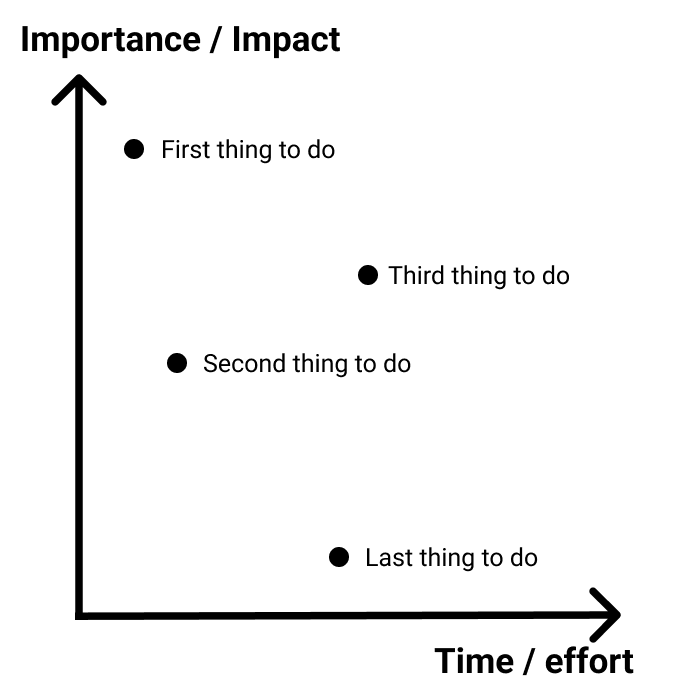We all know the power of habits. But most are still likely underestimating the complete impact of small habits, whether they are good or bad, on one’s overall accomplishments and ultimately well-being. The reason? The many ripple effects that even simple behaviors can have into other parts of our lives. This article will explore those, why we tend to oversee them, and hopefully give you some added motivation to eliminate poor and establish good habits in your own life.

What are the ripple effects?
When considering the effect of any given action, most will focus on the direct cause. Ate some junk food? Made a habit of eating another candy bar during the day? You’ll probably only see it as costing you an additional $1-2 and adding an additional 250 calories to the day. Added another subscription to a streaming service to add another TV series to your agenda? You may only think of it in terms of it perhaps costing another $10-15 a month and consuming another hour a day. Likewise with positive habits, running for 15-30 minutes is often evaluated as another calory burn for the day, and for contributing to better cardiovascular health.
However, what we typically fail to account for is how the effects of these actions spill over in other parts of our lives that are seemingly unrelated. The habit of eating more sugar will contribute to more peaks and valleys in your energy levels, thus likely having negative effects on your mood or performance at different parts of the day. The likely resulting accumulation of weight may not seem significant at first, but later will also have similar negative impacts on other parts of your life through reduced self-esteem, ability to do sports activities you may enjoy, make you less attractive, and have an increased risk of various illnesses.
Similarly, simple and seemingly irrelevant positive habits can have significant ripple effects on other parts of your life over time. A good example is a habit such as walking 15-30 minutes in the early morning just after waking up each day. Doing so will have a significant impact on your sleep, as described in an earlier article the importance of early daylight, as well as securing at least some physical activity for the day. One might look at this simple habit as just another bullet point amongst many for how to improve sleep, or just a few steps but the effects, especially over time, goes well beyond that. Good sleep has an impact on several things, from weight to mood and productivity. Establishing good habits for better sleep will likely end up increasing your net worth, improving your job career, making you feel better during the day, and improving your relationships with others. And how much value and further benefits will all of that, in turn, provide you with?
It is therefore key to understand that both good and bad habits, which are established by even the smallest things that we choose to do, will have significant long-term effects. So why don’t we go after them more relentlessly?
Short term bias
Most of us are affected by a short-term bias in almost all that we do. Whether it is our perception of the crypto or stock market, our view of ourselves and how our lives are going, or indeed the impacts of the actions that we make. In the case of the markets, it's easy to be too heavily influenced by the latest news or price actions. That’s one reason why people buy high and sell low, they make decisions meant to last for years based on the picture they may have seen in the past days or weeks. When it comes to our lives, we may have several things going on to be grateful for, have a nice education, have a good network of friends, etc. Yet, it may only take a few weeks of things going south before one may start to feel that life is bad, become ashamed, or maybe even depressed. We tend to give too much weight to whatever we’ve experienced most recently. After all, that’s what we have fresh in mind occupying our thoughts. But that doesn’t make it true.
Likewise, for actions that we make with small habits, it’s easy to judge their impact by the effects they have had in close memory. Eating those extra candy bars didn’t make you fat in a week. Nor did watching one season of a new TV show stomp the progress you were making in your career. However, The long-term effects are what matters, and they are far more significant. Especially when taking the ripple effect into account. It may take 5 years to realize how a slight change in eating habits has accumulated to have a significant impact on health, and how that, in turn, has been the cause for several other changes in one's life for better or worse.
So forget the past week, and ignore the short-term discomfort of imposing a change in habit nor feel discouraged if it doesn’t provide visible short-term results. Instead, define the ultimate goal you’ll want to reach, and describe the small things that a person most likely to reach those goals would be most likely to do on a daily basis. Then start by doing those things!
Start by identifying the simplest change you can make
We all likely have things we can do better. Whether it is getting more sleep, getting more daylight exposure and fresh air, eating slightly healthier, exercising a bit more, etc. A trap that many people fall into is spending too much time looking up all the most ideal solutions to all their current imperfections and while likely learning a lot and feeling productive, end up doing very little. Instead, one is better off simply starting with something small as I’ve written before arguing how taking action is the real source of motivation in The lesson about motivation I wish I learned many years ago: “start by doing!”.
But where should we start? Here’s a simple trick that I like to use when needing to make priorities in life. I use it whether it is to decide what task I should handle next at work, or what change I should make in my life next.

Have a 2-axis chart either on your PC, on a board, or just on a sheet of paper. Let one axis describe the time or effort needed to do something, and then the other describes how important it is or how impactful it will be. Prioritize things that are quick do to or have a short deadline if we’re talking about work, that is the most important. Applying this to habits worth adding or removing, you should prioritize the things that you can get done right away with low effort, that have some benefit, even if it’s only a small one.
Understanding that it takes about a month for a new change in habits to stick focusing on getting a few new changes implemented at a time tends to work the best.
